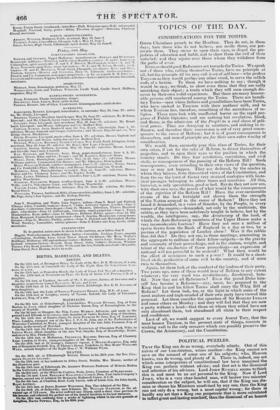TOPICS OF THE DAY.
CONSIDERATIONS FOR THE TORIES.
Goon Christians preach to the Heathen. They do not, in these days, hate those who do not believe, nor revile them, nor per- secute them. They strive to open their eyes, to dispel the pre- judices of education and habit, and to show them the evil of their unbelief; and they rejoice over those whom they withdraw from the paths of' error.
Even so should good Reformers act towards the Tories. We speak not ( f those who, calling themselves Tories, have no principle at all, but the principle (it' we may call it so) of self-love—who profess Toryism as they would profefss any other creed, to serve the selfish ends of a faction. To theni we have nothing to say ; though it would be easy, we think, to show even them that they are sadly mistaking their object ; a truth which they will soon enough dis- cover by their own woful experience. But there are many honour- able persons still numbered among the Tories. There are heredi- tary Tories—men whose fathers and grandfathers have been Tories, who have sucked in- Toryism with their mothers' milk, and to whom Toryism has, therefore, something of the sacredness of re- ligion. These men look with unaffected horror on the rapid pro- gress of Public Opinion; and see nothing but revolution, blood, and flame, in the admission of the People to a real share of poli- tical power. They are decaying ill numbers, and sinking in in- fluence, and therefbre their conversion is not of very great conse- quence to the cause of Reform; but it. is of great consequence to themselves, and men of principle are for their own sakes worthy of consideration.
We would, then, earnestly pray this class of Tories, for their own sakes, if not for the sake of Reform, to divest themselves of prejudice, and to open their eyes to the position in which the country stands. Do they fear revolution, convulsion, and civil strife, as consequences of the passing of the Reform Bill ? Such consequences, even according to their own views of the question, may or may not happen. They are deduced, by the oracles in whom they believe, from theoretical views of the Constitution, and from (to say the least of them) very strained analogies with histo- rical passages belonging to other times and countries. All this, however, is only speculation, good or bad. But do they not now see, with their own eyes, the proofs of what would be the consequences of the rejection of the Reform Bill ? Have the ever-memorable events of the last fortnight not shown them the strength of the Nation arrayed in the cause of Reform? Have they not heard it demanded, in a voice of thunder, by the People, in every corner of the empire,—demanded, not only by the multitude, the rabble, as they have been sedulously taught to believe, but by the wealth, the intelligence, nay, the Aristocracy of the land, of which the Anti-Reforming members of the Upper House make a very inconsiderable fraction? Have they not seen a million of specie drawn from the Bank of England in a day or two, by a portion of the population of' London alone ? Was it the rabble that did this ? Do they not see, in those meetings, amounting in the aggregate to millions of their fellow-subjects—in the gravity and solemnity of their proceedings, and ill the station, weight, and talent of the conductors of those proceedings—an expression of national will too powerful to be resisted? What then would be the effect of resistance to such a power? It would be a short- lived strife, productive of some evil to the country, and of utter ruin to themselves.
Again, let them look at the conduct of the leaders of their party. Two years ago, none of them would bear of Reform to any extent whatever; the very word was revolutionary, Jaeobinical, hate- ful. Now they are all Refbrmers ! Even the proud Duke him- self has become a Reformer—nay, more, hay proposed to the King that he and his fellow Tories shall carry the Whig Bill of Reform ! Let them look, too, at the light in which some of the most zealous and high-minded of their own party have viewed this proposal. Let them consider the speeches of Sir ROBERT INGLIS and some others on Monday ; and they will feel that they are now a party without a head—that those on whom they relied have not only abandoned them, but abandoned all claim to their respect and confidence.
Last of all, we would suggest to every honest Tory, that the most honest Toryism, in the present state of things, consists in wishing well to the only measure which can possibly preserve the Crown, the Aristocracy, and the Constitution.


























 Previous page
Previous page